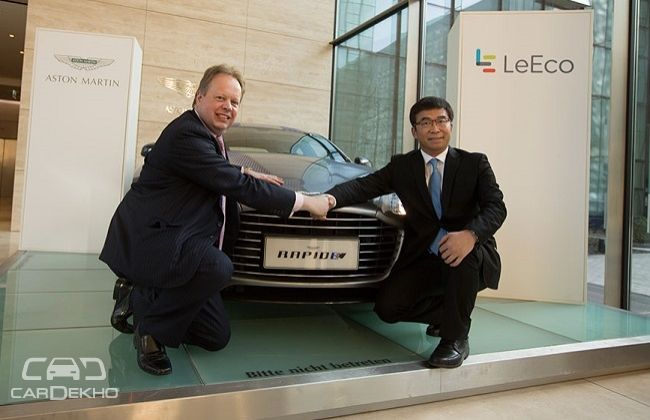Aston Martin to co-develop an electric car with China's LeEco
Published On Feb 18, 2016 04:27 PM By Akshit
- Write a comment
Aston Martin, on Wednesday, announced a venture with Chinese consumer electronics firm LeEco(formerly known as Letv), to jointly develop the British carmaker’s first electric vehicle. Production version of the Aston Martin RapidE electric vehicle concept will be the collaboration’s first project, before developing other potential electric vehicles, including for LeEco and its funded electric-car startup Faraday Future.

"We have been encouraged by the project speed and technical depth shown by LeEco in the development of the RapidE concept towards full production," said Aston Martin CEO Andy Palmer in a statement. "Bringing the RapidE to market by 2018 is an important milestone for both companies."
The Chinese company intends to provide the powertrain and battery pack for the RapideE, which will be built at Aston Martin’s factory in Gaydon, England and destined to be launched in 2018. “Since the creation of this concept vehicle, Aston Martin and LeEco have been advancing the work on production feasibility including the identification of technology solutions for battery systems and powertrain,” the companies said in Frankfurt on Wednesday.
This move extends the existing collaboration between the two companies, as LeEco and Aston Martin revealed the first fruit of their partnership at the 2016 CES, in the form of an Aston Martin RapideS incorporating a fancy infotainment system from LeEco.
The companies also revealed their plans for a range of low-emission electric vehicles during the second half of the decade. “The second area of the partnership – the development of low-emission vehicle technologies – has been accelerated as they have developed their respective plans for launching a range of new electric vehicles during the second half of the decade,” the duo quoted.
The all-electric sports sedan is part of the Aston’s efforts to more than double its current annual sales to above a former peak of about 7,500 cars, from 3,500 in 2015.















